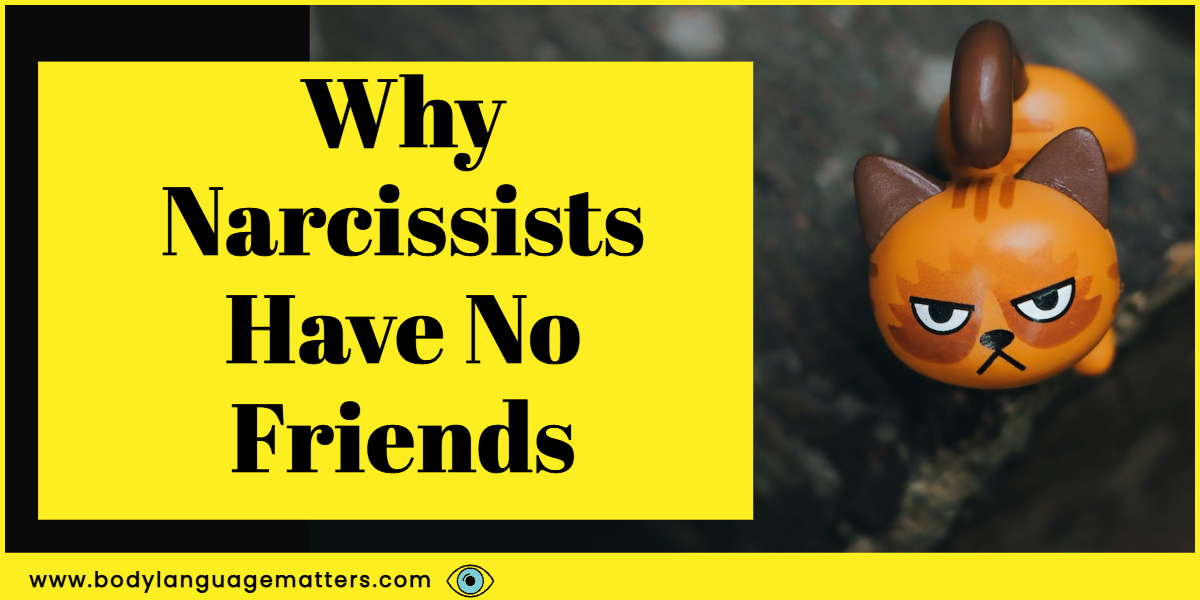In this article, we will delve into the realm of narcissistic friendships and understand why some individuals with narcissistic tendencies struggle to maintain connections with others.
We will also explore the characteristics of narcissistic friends, how they treat others, and what one can do if their friend exhibits narcissistic behavior.
The Characteristics of a Narcissistic Friend. ?♀️
Signs of Narcissistic Traits in a Friend.
A narcissistic friend is an individual with a narcissistic personality disorder (NPD), a condition marked by excessive self-absorption, an inflated sense of self-importance, and a lack of empathy. Such friends are often more focused on themselves, leaving little room for their friends’ well-being.
They are known to exploit others for their gain, lack genuine concern for others’ feelings, and expect excessive admiration and attention from those around them.
Lack of Empathy in a Narcissistic Personality.
Narcissists’ inability to understand and share the feelings of others is a key feature that separates them from people with healthy self-esteem.
They consistently prioritize their own needs over the needs of others, often leading to relationship issues and conflicts.
This lack of empathy makes it challenging for them to form deep, lasting bondswith others.
Narcissist vs. Normal People: The Key Differences.
While everyone may display some narcissistic traits from time to time, individuals with NPD exhibit patterns of behavior that differ significantly from those without the disorder.
They have an insatiable need for admiration, a heightened sense of entitlement, and often engage in manipulation to maintain their inflated self-image.
Normal people generally value reciprocity and mutual respect in their relationships and can empathize with others.
How Narcissists Treat Their Friends and Ruin Friendships. ??⚖️
Narcissistic Friendships: Give and Take or Just Take?
In a narcissistic friendship, the narcissist often adopts an all-take-and-no-give approach, exploiting their friends’ kindness for personal gain.
They may manipulate and guilt-trip friends to meet their own needs while showing no genuine interest in reciprocating.
Consequently, such friendships often become unsustainable as resentment builds up in the other party.
How Narcissists Often End Friendships Abruptly.
Narcissists tend to end friendships suddenly and without warning when they no longer perceive any benefit from the relationship.
They may then try to evoke sympathy from others to justify their callous behavior. Moreover, they rarely experience remorse or take responsibility for their actions, instead pinning the blame on others.
Why It’s Hard to Make a Narcissist Feel Remorse.
Due to their perceived importance and inflated sense of self-worth, narcissists struggle to accept personal accountability for any wrongdoing in their relationships.
This unwillingness to self-reflect and acknowledge fault is a key reason why it’s difficult to make a narcissist feel genuine remorse.
Why Narcissists Have a Hard Time Making Friends. ??
The Role of Narcissism in Friendship Dynamics
Narcissistic traits make it challenging for an individual with NPD to form and maintain genuine friendships.
Their constant need for admiration, manipulation, and exploitation often causes resentment and strain in their relationships, leading to frequent conflicts and the eventual collapse of friendships.
Do Narcissists Have Friends: Myths and Misconceptions
Despite popular belief, some narcissists do maintain friendships – even if their relationships are often superficial and short-lived.
They may also use their charm and charisma to win over new acquaintances. However, the lack of empathy and genuine concern for others often hinders the development of deep, meaningful connections.
How a Lack of Empathy Limits a Narcissist’s Friend-Making Ability.
Empathy is essential to forming and maintaining friendships, as it allows individuals to connect with others and support one another during challenging times. A narcissist’s inability to empathize makes it difficult for them to be a reliable, supportive friend.
What to Do if Your Friend is a Narcissist. ??
Steps to Take if You Suspect Your Friend has a Narcissistic Personality Disorder
If you suspect your friend has NPD, consider evaluating your friendship’s dynamics and discussing your concerns with a mental health professional.
They can provide guidance and help you develop coping strategies if you decide to maintain the relationship.
How to End the Friendship with a Narcissist.
Ending a friendship with a narcissist can be emotionally taxing. Practice self-care and seek support from friends, family, or a mental health professional. Maintain firm boundaries and avoid getting drawn into arguments or manipulation by the narcissist.
Finding Support and Healing from Narcissistic Friendships.
Healing from a narcissistic friendship involves understanding and processing your experiences. Joining support groups and engaging in therapy can help validate your feelings and provide resources for coping with the emotional turmoil resulting from such relationships.
Can Narcissists Change and Have Genuine Friendships? ?
A Study Confirms: Change in Narcissistic Traits is Possible.
Although it is a challenge, change in narcissistic traits is possible. Research indicates that self-awareness and long-term commitment to therapy can help individuals with NPD develop healthier relational patterns and empathy skills.
How Therapy Can Help Narcissists Develop Empathy.
Therapy can play a crucial role in helping narcissists understand the effects of their behavior on others and develop empathy. Through introspection and therapeutic techniques, individuals with NPD may learn healthier ways to navigate relationships and foster genuine connections.
Is Friendship with a Narcissist Worth the Effort?
Friendship with a narcissist can be incredibly challenging and emotionally draining. Ultimately, it is up to each person to weigh the benefits and drawbacks of maintaining such a relationship.
For some, the potential for change and personal growth might merit the effort, while others may choose to distance themselves for their own well-being.
Final Thoughts
Narcissistic friendships are often superficial and short-lived due to the narcissist’s excessive self-absorption, lack of empathy, and exploitation of others. Key characteristics of a narcissistic friend include an inflated sense of self-importance and a constant need for admiration. These traits make it challenging for narcissists to form and maintain genuine friendships.
If your friend exhibits narcissistic behavior, seek guidance from a mental health professional, establish boundaries, and practice self-care. Change is possible through therapy and self-awareness, but maintaining a friendship with a narcissist requires weighing the benefits and drawbacks for your well-being. If you have found this article useful you may find what does cutting off all contact with a narcissist do helpful.

